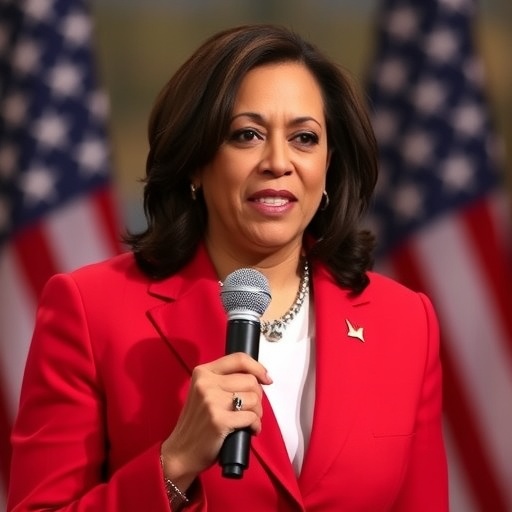Kamala Harris Teases 2028 Presidential Run After Stunning 2024 Loss to Trump, Sparking Democratic Party Turmoil
In a bombshell interview with the BBC that has sent shockwaves through Washington, former Vice President Kamala Harris has declared she’s “not done” with politics and hinted at a possible bid for the White House in the 2028 election. This comes just months after her decisive defeat to Donald Trump in the 2024 presidential race, where she lost by a landslide margin of over 70 electoral votes. Harris’s words, delivered with her signature poise amid the ruins of her campaign, have ignited fierce debates within the Democratic primary circles, raising questions about the party’s future direction and her lingering electability.
The interview, aired late last week, captured Harris reflecting on her tenure and future ambitions during a wide-ranging discussion on global affairs. “I’ve given everything to public service, and I’m not done yet,” she told BBC host Emily Maitlis. “Could I see myself running again? Possibly. The fight for democracy isn’t over.” This subtle yet pointed signal has analysts buzzing, as it marks Harris’s first public acknowledgment of a potential return to the national stage since Election Night 2024, when Trump’s triumphant return to the presidency shattered Democratic hopes.
Harris’s 2024 campaign, plagued by internal strife, economic headwinds, and Trump’s relentless attacks on her record as vice president, ended in humiliation. Polls showed her trailing Trump by double digits in key swing states like Pennsylvania and Georgia, where she had once been a frontrunner. Voter turnout among core Democratic demographics—young people, minorities, and suburban women—dipped dramatically, contributing to what pundits are calling a “red wave redux.” Yet, in the BBC sit-down, Harris framed her loss not as a personal failure but as a broader indictment of a polarized America, vowing to continue advocating for issues like reproductive rights and climate action.
The timing of her remarks couldn’t be more precarious for Democrats still licking their wounds. With Trump back in the Oval Office, pushing an aggressive agenda on immigration and trade, the party is scrambling to regroup. Harris’s flirtation with 2028 has exacerbated anxieties, as it pits her against a crowded field of ambitious contenders eager to claim the Democratic primary mantle. Insiders whisper that her declaration could either rally the base or fracture it further, depending on how the party navigates the post-Trump era.
Harris’s Resilient Post-Defeat Outlook in BBC Spotlight
Delving deeper into the BBC interview, Kamala Harris exuded a mix of defiance and optimism that surprised even her closest allies. Seated in a sunlit San Francisco office—her post-vice presidential base—Harris addressed the elephant in the room: her 2024 landslide loss to Trump. “We fought hard, but the American people sent a clear message,” she conceded, referencing exit polls that highlighted inflation and border security as top voter concerns. Yet, she pivoted quickly to her unfinished business, emphasizing her prosecutorial background and Senate tenure as assets for future leadership.
One poignant moment came when Maitlis pressed Harris on her electability. “Do you regret not stepping aside earlier in the primary?” the host asked, alluding to the chaotic 2024 Democratic primary where Harris clinched the nomination after President Biden’s late withdrawal. Harris paused, then responded with measured candor: “Hindsight is 20/20, but I stand by my decision to lead. The 2028 election will be about vision, not vendettas.” This exchange, clipped and shared millions of times on social media, has fueled speculation that Harris is methodically positioning herself as the experienced warrior against Trump’s legacy.
Behind the scenes, Harris’s team has been active. Sources close to the former VP reveal she’s been advising Democratic candidates in off-year elections and headlining fundraisers for progressive causes. A recent poll by Emerson College, conducted in the interview’s aftermath, showed Harris with a 28% favorability rating among Democrats—down from 45% pre-2024 but still competitive. Her focus on issues like voting rights, where she spearheaded the 2021 federal protections push, resonates with the party’s left flank, even as moderates question her ability to win back Rust Belt voters who swung to Trump in 2024.
Critics, however, aren’t buying the comeback narrative. Republican strategists like Karl Rove have mocked her BBC comments online, tweeting, “Harris 2028? That’s like asking the loser of the Super Bowl to coach the rematch.” Within Democratic ranks, there’s grumbling about her 2024 missteps, including a perceived disconnect with working-class voters. A Politico analysis post-interview noted that Harris’s approval dipped to 38% during her vice presidency, hampered by gaffes on foreign policy and the Afghanistan withdrawal.
Shadows of 2024: Unpacking Harris’s Landslide Defeat to Trump
To understand the stakes of Kamala Harris‘s potential 2028 ambitions, one must revisit the wreckage of 2024. Trump’s victory wasn’t just a win; it was a rout. He secured 312 electoral votes to Harris’s 226, flipping states like Nevada and Wisconsin that Biden had held in 2020. The popular vote margin? A yawning 5.2 million votes in Trump’s favor, per final tallies from the Associated Press. This presidential race exposed deep fissures in the Democratic coalition, with Latino support for Harris plummeting to 52% from 65% in 2020, according to Edison Research.
Harris’s campaign strategy, centered on energizing urban turnout and touting Biden-era achievements like the Infrastructure Investment and Jobs Act, faltered amid soaring grocery prices and cultural backlash to progressive policies. Trump’s rallies, drawing record crowds, hammered Harris on her role in the border crisis—over 2.5 million migrant encounters at the southwest border in fiscal 2024 alone, per Customs and Border Protection data. “Kamala’s open borders let in chaos,” Trump thundered at a Pennsylvania rally, a line that stuck with swing voters.
Internally, the Democratic primary was a mess. Harris entered as the heir apparent but faced challenges from figures like Michigan Gov. Gretchen Whitmer and Pennsylvania Sen. John Fetterman. Her debate performances, often criticized for vagueness, didn’t help. A post-mortem report by the Democratic National Committee, leaked to The New York Times, blamed “messaging failures” and inadequate ground game in rural areas. Harris herself acknowledged some of this in the BBC interview: “We learned valuable lessons about connecting with everyday Americans.”
Economically, the timing was brutal. Inflation hit 9.1% in mid-2022, eroding gains from stimulus checks. Harris’s push for student debt relief, forgiving $10,000 per borrower, was struck down by courts, alienating young voters who felt betrayed. Trump’s counter-narrative of “America First” prosperity, promising tax cuts and energy independence, resonated. By Election Day, RealClearPolitics averaged Trump leading by 3.5 points nationally—a reversal from 2020’s blue wave.
Yet, glimmers of strength emerged for Harris. She won California and New York handily, and her advocacy for abortion rights post-Roe v. Wade overturn galvanized women, with 54% of female voters backing her per CNN exit polls. These pockets of support could form the bedrock of a 2028 election bid, if Harris can broaden her appeal.
Emerging Rivals Heat Up the 2028 Democratic Primary Landscape
Kamala Harris‘s BBC tease has thrust the 2028 election into sharp focus, but she’s far from the only player in town. The Democratic primary is already shaping up as a battle royale, with a diverse slate of governors, senators, and outsiders eyeing the top spot. At the forefront is California Gov. Gavin Newsom, whose polished attacks on Trump during 2024— including a high-profile debate challenge—have burnished his national profile. Newsom, 56, boasts a war chest exceeding $50 million from tech donors and a record on climate initiatives that mirrors Harris’s priorities.
Then there’s Pennsylvania Gov. Josh Shapiro, 51, whose bipartisan bonafides helped Democrats hold the Keystone State in 2022 midterms. Shapiro’s focus on education and infrastructure has earned him crossover appeal, with a recent Quinnipiac poll showing him at 22% in a hypothetical Democratic primary field—edging Harris’s 19%. “The party needs fresh energy, not rehashes of 2024,” a Shapiro advisor told Reuters, subtly shading the former VP.
Don’t count out Transportation Secretary Pete Buttigieg, 42, whose sharp-elbowed defenses of Biden’s agenda on cable news have made him a media darling. Buttigieg’s 2020 primary run proved his fundraising chops, raising $100 million in small-dollar donations. His Midwestern roots could help reclaim Rust Belt states lost to Trump. Meanwhile, progressive firebrand Rep. Alexandria Ocasio-Cortez, 34 by 2028, is building a grassroots army through her podcast and social media empire, though her electability in general elections remains untested.
Veterans like Sen. Amy Klobuchar of Minnesota and former HUD Secretary Julian Castro are also circling, each bringing regional strengths. A Washington Post survey of party insiders pegs the field as wide open, with no clear frontrunner. Harris’s entry could consolidate the establishment wing, but it risks alienating reformers who blame her for the 2024 debacle. Fundraising data from the Federal Election Commission shows early 2028 PACs already pouring $20 million into exploratory efforts, signaling a high-stakes presidential race ahead.
Gender dynamics add another layer. Harris’s potential run would test whether Democrats are ready for another female nominee after 2024’s backlash, which some attributed to sexism. “We’ve seen what happens when the party doesn’t unite behind women,” said Gloria Allred, a prominent attorney and Harris supporter, in a recent op-ed. Yet, with figures like Michigan’s Whitmer in the mix, the primary could become a showcase for diverse leadership.
Trump’s Enduring Grip Fuels Democratic Anxieties Over 2028 Strategy
As Kamala Harris mulls a comeback, Trump‘s shadow looms large over the 2028 election. Now 78 and serving his second non-consecutive term, the 45th-and-47th president is reshaping the GOP in his image, endorsing MAGA loyalists and pushing policies like mass deportations that poll at 60% approval among Republicans, per Gallup. His influence could extend beyond 2028 if he grooms a successor like Vice President JD Vance, 39, whose Rust Belt appeal mirrors Trump’s.
Democrats fear a repeat of 2024’s vulnerabilities. Trump’s economy-first messaging, coupled with cultural wins on school choice and anti-woke initiatives, has sustained his base. A Fox News poll post-inauguration showed 52% of Americans approving of his early moves, including executive orders slashing regulations. For Harris, confronting this means addressing her 2024 weaknesses head-on—perhaps by pivoting to economic populism, as some advisors urge.
Party strategists are divided. The moderate wing, led by figures like Sen. Kyrsten Sinema (now independent), calls for a centrist like Harris to broaden the tent. Progressives, however, push for bold reforms, warning that timidity lost 2024. A joint report from the Brookings Institution and Center for American Progress recommends investing $500 million in voter outreach to Latinos and youth, demographics Harris must recapture.
Legal battles add intrigue. Trump’s ongoing cases, including the January 6 probes, could either weaken him or rally his supporters. If convictions stick, it opens a lane for Democrats; if not, Harris faces an uphill climb. Her BBC comments have prompted a flurry of donor calls, with one Silicon Valley mogul telling Bloomberg, “Kamala’s experience is irreplaceable, but she needs to show evolution.”
Looking ahead, the Democratic primary kicks off in earnest with 2026 midterms, where control of Congress could dictate 2028 momentum. Harris’s next moves—perhaps a book tour or policy white paper—will signal her seriousness. As one veteran operative put it, “2028 isn’t about redemption; it’s about reinvention.” With Trump eyeing a dynasty, the stakes for Harris and her party couldn’t be higher, promising a presidential race defined by revenge, renewal, and raw ambition.
In the coming months, watch for Harris’s speaking engagements and PAC formations. If she formalizes a bid by mid-2027, it could force rivals to accelerate their timelines, turning the 2028 election into the most anticipated political showdown since 2016. For now, her BBC whisper has awakened a sleeping giant in Democratic politics, setting the stage for a fierce intra-party clash under Trump‘s watchful eye.








